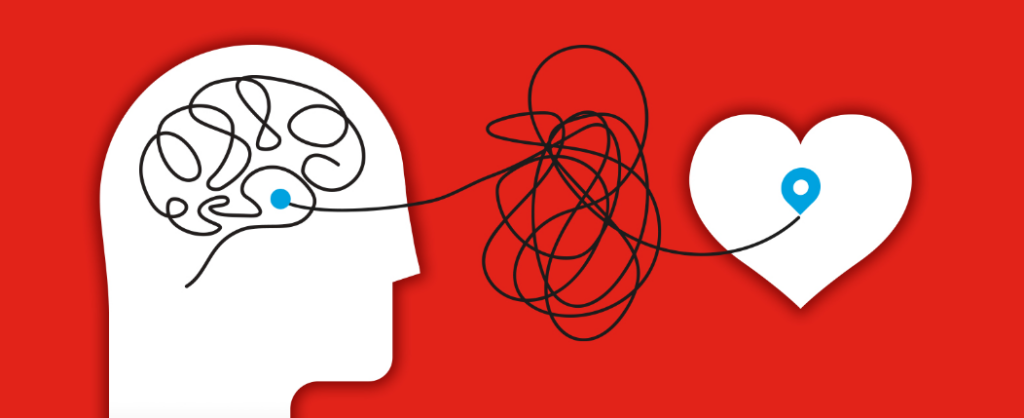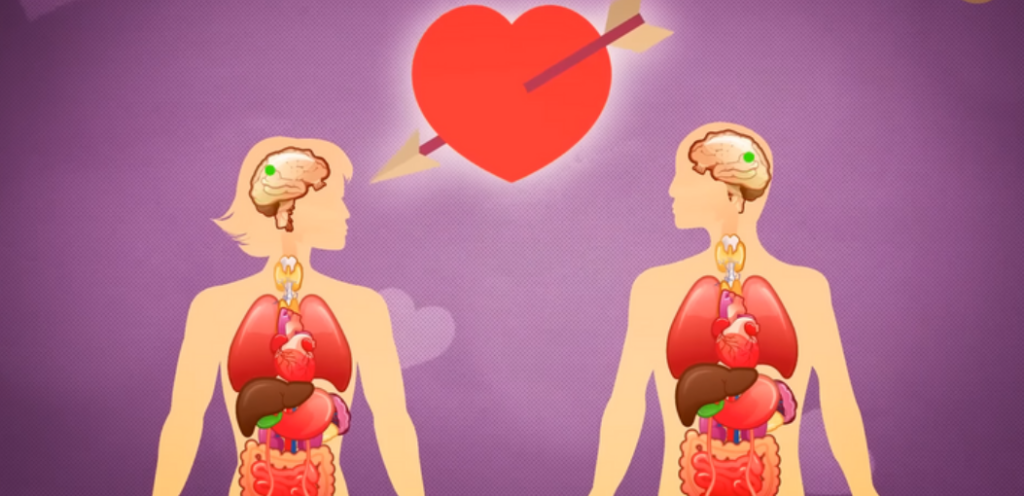Last Updated on October 18, 2024 by Rachel Hall
- How Falling in Love Impacts Your Brain and Body: The Psychological Changes Explained
- 1. The Science Behind “Butterflies in the Stomach”
- 2. Dopamine and Euphoria: Love’s Natural High
- 3. Oxytocin: The “Love Hormone” That Deepens Bonds
- 4. Cortisol: Why Love Can Be Stressful at First
- 5. Why You Can’t Stop Thinking About Your Partner
- 6. How Romantic Love Affects Your Physical Health
- 7. The Role of Serotonin in Balancing Your Mood
- 8. Love’s Pain-Reducing Power
- 9. Testosterone and Sexual Desire
- The Profound Effects of Falling in Love on Your Brain and Body
How Falling in Love Impacts Your Brain and Body: The Psychological Changes Explained
When you’re falling in love, it’s not just your heart that’s affected—your entire brain and body undergo a series of complex changes. These changes are driven by powerful hormones and neurochemicals, leading to a wide range of physical and emotional responses. From the fluttering feeling of butterflies in the stomach to the deep bond that forms with your partner, love touches every part of you. Let’s take a closer look at the science behind these fascinating transformations and understand why romantic love is so powerful.
1. The Science Behind “Butterflies in the Stomach”
One of the first signs of falling in love is the unmistakable sensation of butterflies in the stomach. But what exactly causes this physical response? It’s all due to the vagus nerve, which connects your brain and body. When you see or think about your love interest, the vagus nerve is activated, leading to that fluttery feeling in your stomach. This response is not just emotional; it’s a direct link between your brain and your gut, showcasing how love influences multiple areas of your body.
The Role of Adrenaline and Norepinephrine
In the initial stages of love, your body produces a surge of adrenaline and norepinephrine, two hormones that prepare your body for action. These physiological responses are part of the fight-or-flight system, which kicks in when you’re emotionally stimulated. This is why your palms sweat, your heart races, and your cheeks flush when you’re around someone you love. These reactions aren’t just nerves—they’re your body’s way of focusing your attention and energy on your romantic relationship.

2. Dopamine and Euphoria: Love’s Natural High
When you’re falling in love, your brain undergoes a powerful chemical shift, dominated by dopamine, the neurochemical responsible for pleasure and reward. Dopamine is released in the reward center of your brain whenever you think about or spend time with your partner, creating an overwhelming sense of euphoria. This chemical reaction not only makes you feel great but also encourages you to seek out more interactions with your love interest.
Love as a Natural Addiction
The release of dopamine during romantic love has been compared to the effects of addictive substances like drugs. This is because dopamine triggers the same pathways in the brain, making the experience of love like dopamine and other addictive substances. As a result, you feel an intense drive to be around your partner, leading to behaviour that mirrors addiction. This is why love can feel all-consuming, especially in the initial phase of falling in love.
3. Oxytocin: The “Love Hormone” That Deepens Bonds
Known as the “love hormone”, oxytocin plays a critical role in forming emotional bonds and deepening connections in romantic relationships. This hormone is released during moments of physical intimacy, such as hugging, kissing, and even just holding hands. The release of oxytocin fosters trust, empathy, and closeness, making it an essential component of lasting relationships.
The Role of Oxytocin and Vasopressin in Long-Term Love
While oxytocin is responsible for creating those initial feelings of closeness, vasopressin comes into play as your relationship develops. Together, oxytocin and vasopressin help transition your relationship from passionate infatuation to a deep, committed bond. These two hormones are particularly important in monogamous relationships, where emotional security and trust are key.
In a study by the University of Wollongong, researchers found that vasopressin plays a significant role in fostering protective behaviours and increasing feelings of attachment over time. It is this hormonal interaction that helps romantic love evolve into a more stable and enduring connection, creating what some might call “soul mates.”

4. Cortisol: Why Love Can Be Stressful at First
While love is often associated with joy and excitement, the initial stages of a relationship can be quite stressful. This is due to the spike in cortisol, the body’s main stress hormone, which increases during periods of uncertainty, such as when you’re not sure if your feelings are reciprocated. The rise in cortisol triggers a stress response, causing physical symptoms like a racing heart, sweaty palms, and heightened alertness.
Cortisol’s Long-Term Effects
Interestingly, as your relationship becomes more secure, your body’s cortisol levels return to normal, reducing stress and promoting a sense of relaxation. Studies have shown that couples in long-term, committed relationships have lower baseline levels of cortisol, which contributes to their overall well-being.
In fact, according to a study published in the journal of the American College of Cardiology, people in stable relationships have a reduced risk of cardiovascular issues, partly because of the lower stress levels. This is one of the reasons love can lead to a longer life.
5. Why You Can’t Stop Thinking About Your Partner
Have you ever found it hard to concentrate on anything but your love interest? This is because falling in love activates certain areas of the brain associated with obsessive behaviour. The anterior cingulate cortex, a brain region linked to obsessive-compulsive disorder, is responsible for those repetitive thoughts about your partner. This brain activity can make it feel like your partner is always on your mind, especially during the initial stages of love.
In the early days of a relationship, this can feel thrilling, but it also explains why new relationships can be mentally exhausting—you’re constantly thinking about your partner and planning your next interaction.
6. How Romantic Love Affects Your Physical Health
Love doesn’t just make you feel good—it also has measurable benefits for your physical health. Being in a romantic relationship can improve your heart health, boost your immune system, and even lower your risk of chronic diseases. Research has shown that people in long-term, committed relationships have lower rates of hypertension, heart disease, and even certain types of cancer.
Love Might Lead to a Longer Life
According to a study published in the journal of the American College of Cardiology, people who are married or in long-term partnerships are more likely to live longer than their single counterparts. The emotional support and security that come with being in a stable relationship contribute to better health outcomes, both mentally and physically. The study found that married people or those in committed relationships are less likely to develop vascular disease and more likely to live longer healthier lives.
7. The Role of Serotonin in Balancing Your Mood
While dopamine is responsible for the exhilarating highs of love, serotonin works behind the scenes to keep your emotions balanced. This hormone helps regulate your mood, ensuring that you don’t become overwhelmed by the emotional intensity of love. When you’re in a stable, loving relationship, serotonin helps you feel calm, content, and emotionally stable.
Serotonin plays a key role in transitioning a relationship from the exciting, uncertain initial stages to a more secure and balanced long-term connection.
8. Love’s Pain-Reducing Power
In addition to its emotional benefits, love has been shown to reduce physical pain. When you’re in love, the brain’s reward pathways are activated, which can block pain signals and reduce your perception of discomfort. A study published in the journal PLoS ONE found that people in new relationships who looked at pictures of their partners experienced less pain than those who looked at pictures of acquaintances.
The Phenomenon of “Broken Heart Syndrome”
While love can reduce pain, it can also cause it. Broken heart syndrome, also known as stress-induced cardiomyopathy, occurs when intense emotional distress triggers symptoms similar to a heart attack. The surge of cortisol and other stress hormones during a breakup or the loss of a partner can have real, physical consequences, making the experience of heartbreak both emotionally and physically painful.hormone is
9. Testosterone and Sexual Desire
The rise in sexual desire during the early phases of love is largely due to the increase in testosterone. This sex hormone is responsible for heightening physical attraction and increasing sexual desire. In both men and women, testosterone levels increase when they’re attracted to someone. This hormonal surge not only fuels physical attraction but also plays a crucial role in maintaining the high energy and excitement that comes with the initial stages of love.
High Passion in the Early Phases of Love
During the initial high of a relationship, couples often experience an overwhelming sense of desire and passion. This is largely due to the interplay between testosterone, dopamine, and other sex hormones that stimulate the brain’s reward center. The combination of these hormones increases your energy levels, making you feel euphoric and deeply connected to your partner. This stage is marked by intense emotions, frequent physical intimacy, and a strong desire for sex.
The Profound Effects of Falling in Love on Your Brain and Body
The process of falling in love is a full-body experience, driven by a complex interaction of hormones and neurochemicals that affect both your body and brain. From the release of oxytocin that fosters emotional bonds to the dopamine that fuels the excitement and euphoria of new love, these changes are essential for building and sustaining romantic connections.
Love can make you feel like dopamine and oxytocin are taking over, influencing your thoughts, behaviour, and even your physical health. Whether it’s the rush of adrenaline that causes your palms to sweat when you’re with your partner or the long-term health benefits of a committed relationship, love impacts nearly every aspect of your life.

Rachel Hall, M.A., completed her education in English at the University of Pennsylvania and received her master’s degree in family therapy from Northern Washington University. She has been actively involved in the treatment of anxiety disorders, depression, OCD, and coping with life changes and traumatic events for both families and individual clients for over a decade. Her areas of expertise include narrative therapy, cognitive behavioral therapy, and therapy for traumatic cases. In addition, Rachel conducts workshops focusing on the psychology of positive thinking and coping skills for both parents and teens. She has also authored numerous articles on the topics of mental health, stress, family dynamics and parenting.








Leave feedback about this